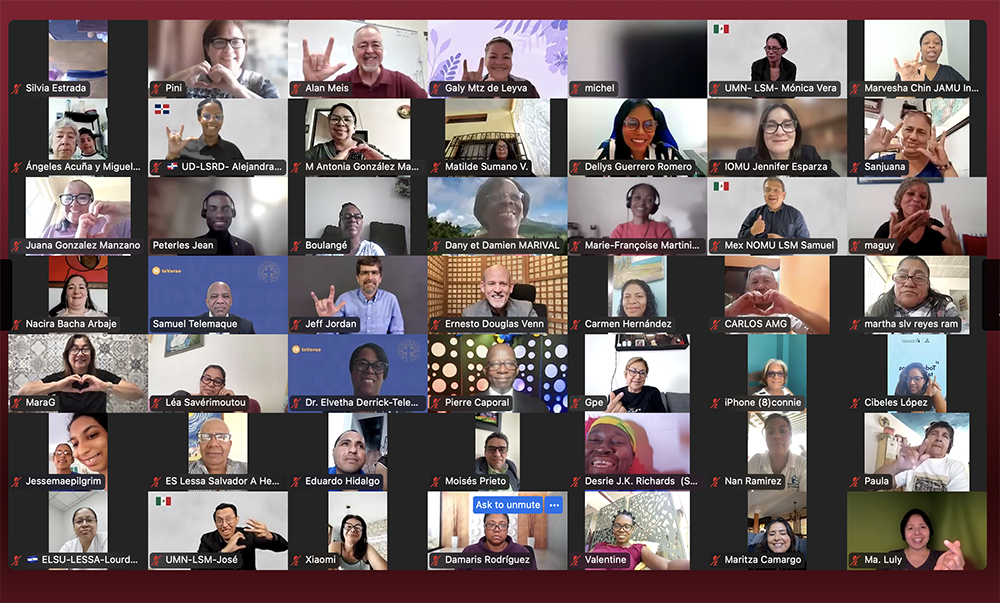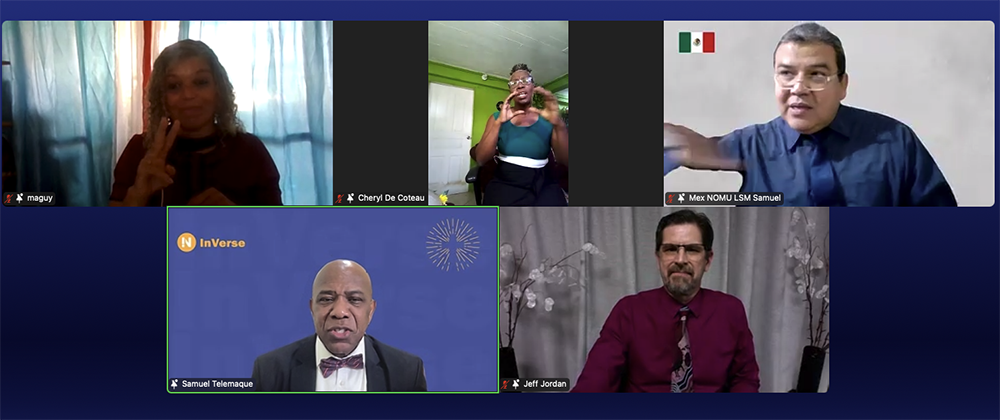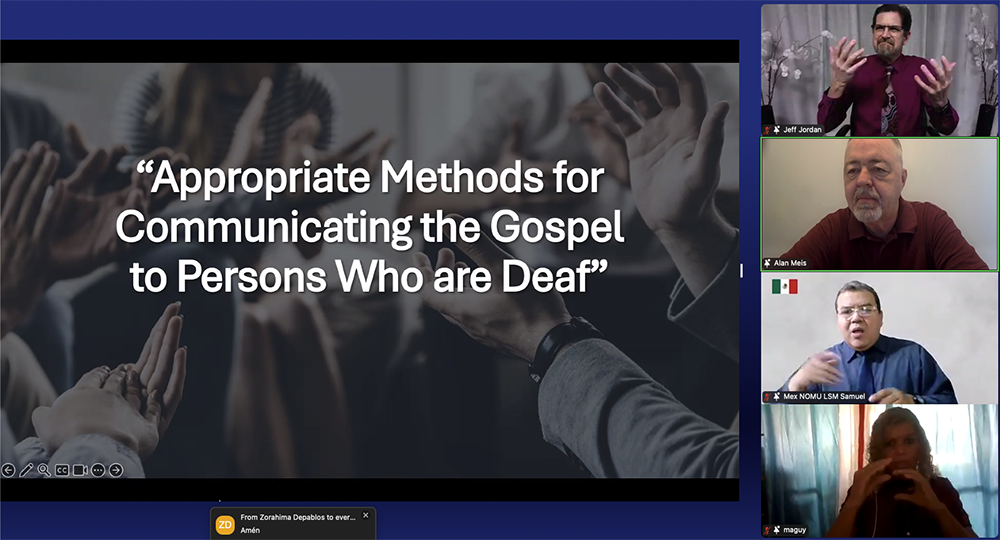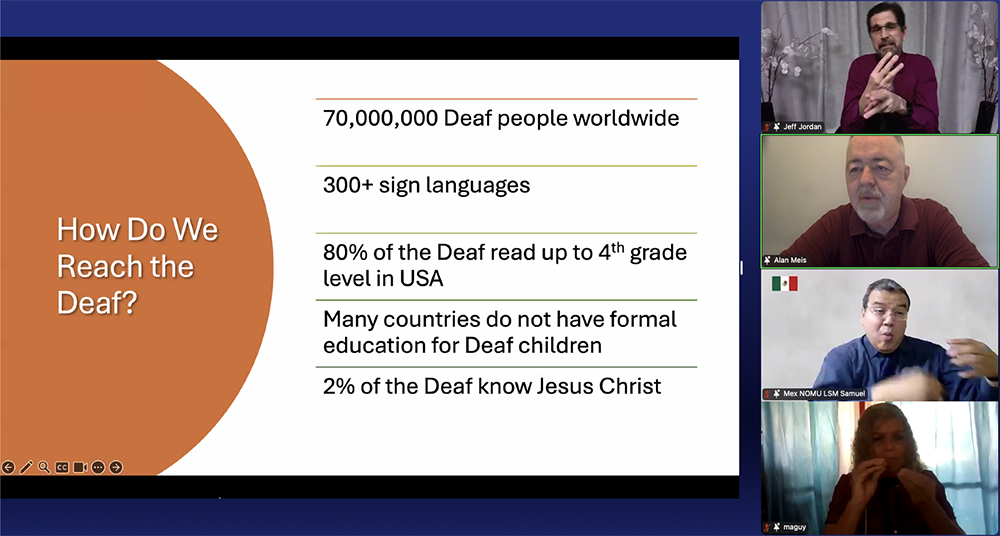Inter-America’s Virtual Retreat Connects Adventists Involved with Special Needs
Adventist Possibility Ministries event calls leaders and members to grow in awareness and support.
May 2, 2025 | Miami, Florida, United States | Inter-American Division News Staff
The Inter-American Division (IAD) recently celebrated the 10th anniversary of its Adventist Possibility Ministries (APM), focusing on inclusivity and spiritual, emotional, and physical healing for individuals with disabilities. Organized by IAD Possibility Ministries Director Samuel Telemaque, the region-wide held April 9-13, 2025 virtual retreat connected more than 600 church leaders, APM directors, and church members involved in ministering to those who suffer disabilities. The virtual event also featured speakers who discussed topics such as surviving loss, caregiving, mental impairment, and ministering to the deaf, as it encouraged participation from local churches and communities.
Embracing Your Scars
In an opening devotional, Ernesto “Douglas” Venn, current assistant to the president of the General Conference for Adventist Possibility Ministries (APM) urged participants to see scars and disabilities not as sources of shame but as opportunities for God’s glory. “Jesus has scars too,” Venn reminded his audience. “And your scars can be used to tell God’s story through your life.”

Part of the more than 600 persons who participated during the Inter-American Divisions Adventist Possibility Ministries Retreat virtual event, April 9-13, 2025. The event marked the 10th anniversary of the ministry across the IAD territory. [Photo: IAD Screenshot]
Dealing with Bereavement and Loss
In the next segment, Dr. Efraín Velázquez, president of the IAD Theological Seminary (SETAI) discussed how to deal with bereavement and loss. Velasquez shared their family experience with Ben, one of his sons, who was neurodivergent and suffered depression since childhood. Ben grew up and completed university studies but eventually could not overcome his chronic depression and committed suicide. “How do you face a loss like that?” Dr. Velázquez asked. “My role is not to explain everything related to neurodivergence and depression but to create awareness about it,” he said.
Speaking about grief, Dr. Velázquez also emphasized that experts agree that not everyone process grief and bereavement in the same way. “Each loss is unique and should not be compared,” he shared, quoting Dr. Carlos Fayard. He also explained that grief is a process, not an event, and a cyclical rather than a linear one.
Dr. Velázquez encouraged people suffering a loss to seek help when and as much as needed. “Grief is normal but is complicated,” he reminded participants, and suggested, “take seriously small losses (which will prepare you for bigger ones), take time to heal, and release stress in a healthy way.” Among other things, he also suggested give meaning to a loss, trust in another person—a friend, for instance—, and find spiritual renewal.

Pastor Samuel Telemaque (left), Possibility Ministries director for the Inter-American Division, speaks during the virtual event alongside Pastor Jeff Jordan (right), associate coordinator for Deaf Ministries at the General Conference, as interpreters (top) convey the spoken messages. [Photo: IAD Screenshot]
After Velázquez, Professor Linda James discussed how to care for the caregiver—those people who provide direct care to another person. She also shared from her personal experience caring for an adult son with special needs. In her case, providing that care includes being responsible for his medication, transportation, and emotional support.
Professor James emphasized the importance of church support and the need for more resources and understanding of those with special needs. She also called her audience’s attention to the emotional and physical toll of caregiving, including her own experience with her child becoming homicidal during the COVID-19 pandemic.
At the same time and despite all the challenges she faces as a caregiver, Professor James said she is thankful. “I refused to believe I am cursed; other than the fact that sometimes I get discouraged, I am happy to know that I am blessed.” In that sense, Professor James called everyone—especially caregivers—to keep trusting God. “Keep trusting in God’s plan while caring for your loved ones,” she said, “because God has a plan for [our] life and also for [our children], and no one can disturb that plan.”
At the closing of the April 9 session, Pastor Telemaque encouraged attendees to extend invitations to people with disabilities and those who are not Adventists to connect with the ministry. He emphasized the importance of inclusivity in ministry and encouraged attendees to invite friends to the event.

Pastor Jeff Jordan (top right), associate coordinator for Deaf Ministries at the General Conference, speaks during a presentation during the virtual event. [Photo: IAD Screenshot]
Adventist Possibility Ministries is based on the belief that “all are gifted, needed, and treasured.” It is grounded in the belief that the gospel transforms the way we see ourselves, others, and God.
According to ministry leaders, the work of APM has been defined not as a program but as a movement that helps us to see through the eyes of a loving God strengths and possibilities in seven specific groups. These include the deaf, the blind, the physically immobile, those who have mental health challenges, orphans and vulnerable children, those mourning loss, and the support of caregivers.
In the IAD, the past decade focused on awareness, acceptance, and action. “The goal was to integrate this ministry into the culture of every local church,” leaders reported. “We’re happy to see advancement across the territory with many programs effectively implemented.”
Telemaque emphasized that every person is valuable in God’s sight. “We are all broken, and we find wholeness by helping others mend their brokenness,” he said. Identifying the spiritual gifts of individuals with disabilities and encouraging them to serve is crucial for growing APM.
In Jamaica, the Deaf Adventist Church in Portmore is expanding. In the Dominican Republic, a large group of youth volunteers ministers weekly to the deaf. In Mexico, trained volunteer interpreters serve the deaf population nationwide.

Pastor Jeff Jordan (top right), associate coordinator for Deaf Ministries at the General Conference, highlights the challenge the Adventist Church faces in reaching the 70 million deaf people worldwide. [Photo: IAD Screenshot]
New Strategy to Expand APM
The 10th anniversary marked the launch of a new strategy focused on empathy, wholeness, social connection, and spiritual healing to support various levels of physical recovery.
Leaders emphasized that ministry to persons with disabilities is, in fact, ministry to all. “We have no time to lose,” said Telemaque. “We must recognize people with disabilities as a people group, like Muslims or Hindus, and build ministries in communities to show society—including government officials—that the church cares and seeks to minister to them wholistically.”
Jeovanny Barrera contributed information to this report.